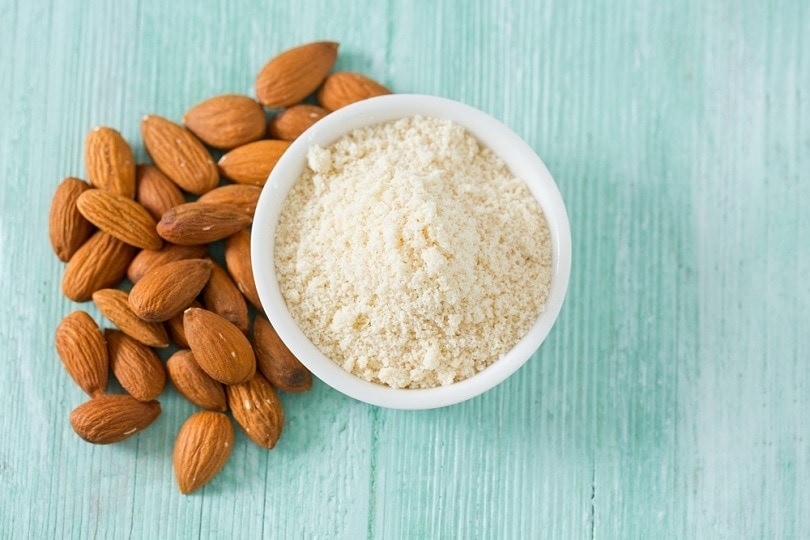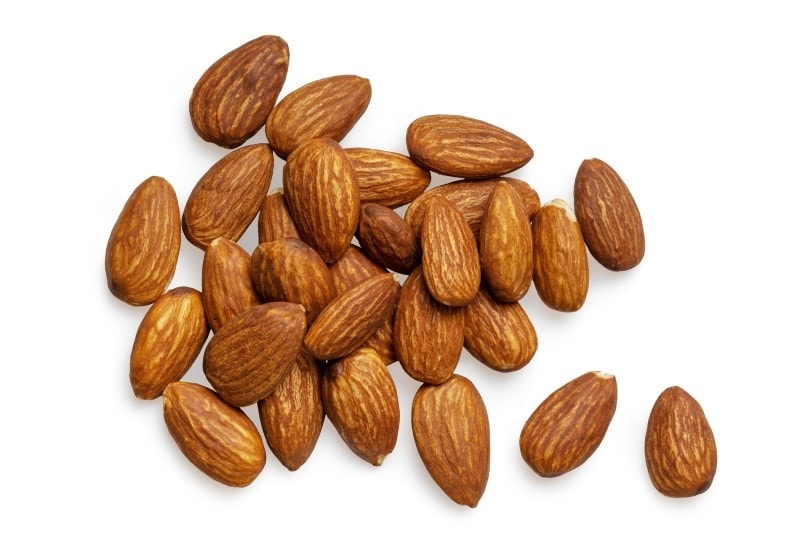Can Dogs Eat Almond Flour? Vet-Reviewed Facts & Considerations

Updated on

Several pet parents are tempted to treat their fur babies to edible goodies other than their pup’s daily dog kibble. Whether these are meaty table scraps or baked desserts, owners should always proceed cautiously. Many human foods are unsafe and even toxic to dogs. If you want to bake up a delicious dish for your pup, you may wonder what types of flour are safe for dogs.
While it’s rare, some pups are allergic to gluten and react negatively to wheat flour. So, can your dog consume almond flour? Yes, they can. However, you should always feed almond flour to your dog in small doses. To get a better understanding of almond flour and canines, let’s take a deeper look at this flour and its possible health benefits and drawbacks for your dog.
Can Dogs Eat Almond Flour?
Your dog can safely eat almond flour, and almonds are also safe for your pet to consume. In fact, many pups love the taste of almonds. However, some canines might be sensitive or even allergic to these legumes and can experience vomiting, diarrhea, or skin problems. Also, the high fat content of almonds means the amount consumed by your dog must be strictly controlled, or it can lead to obesity later.
As for almond flour, while you won’t be feeding your dog straight almond flour, baked goods containing it aren’t toxic to dogs. Your pet can safely consume products with almond flour as long as they don’t contain additional additives, including sweeteners like xylitol.

Why Can’t My Dog Consume Xylitol?
Many types of flours contain xylitol. Although perfectly safe for people, the sugar alcohol is highly toxic to dogs. If your pet ingests xylitol, their confused pancreas will secrete insulin, leading them to suffer from low blood glucose. This can also result in seizures, liver failure, and even death.
- Weakness
- Tremors
- Vomiting
- Seizures
- Lethargy
- Difficulty standing or walking
- Coma
If you think your dog ate xylitol, contact your vet immediately.
Health Benefits of Almond Flour for Dogs
For people, eating almond flour as a substitute for white flour has many health perks. Not only does almond flour have fewer sugars and carbs, but it can also promote digestive health and lower your risk of disease. Almond flour also provides proteins and contains vitamin E and other antioxidants, which can combat diabetes, stroke, cancer, and heart disease.
However, will your dog enjoy these same health benefits of almond flour? The short answer is no. While the occasional almond butter treat is fine, don’t try to enhance your dog’s daily diet with almond flour.
What Flours Should I Avoid Feeding My Dog?
Many flours are not toxic for your dog, but since your dog’s food is likely already high in carbohydrates, adding more carbohydrates should be avoided. An alternative flour that has less carbohydrates and provides proteins or healthy fats might be a better option.
- Wheat flour
- Corn flour
- Rice flour
- Oat flour
- Cassava flour
- Tapioca flour
Alternative Dog-Safe Flours
- Cricket flour
- Hemp flour
- Ground flaxseed flour
- Garbanzo bean flour
- Soy flour
- Coconut flour
How to Feed Your Dog Almond Flour
You can occasionally treat your pet to a baked goodie containing organic almond flour with no additional additives. Never feed your pet pure almond flour. Instead, consider serving dog-friendly baked goods, such as a baked biscuit or pup-cake.

Bottom Line
While dogs can safely eat products containing organic almond flour, you shouldn’t be feeding your pet almond flour every day. Instead, treat them to the occasional baked cookie. Never feed your pet any flour containing artificial ingredients, especially xylitol. If you think your pet ingested xylitol, contact your vet right away.
So, go ahead and bake some wholesome treats for your dog using organic almond flour! They’ll love it as much as you do.
- See also: Can Dogs Eat Marzipan?













